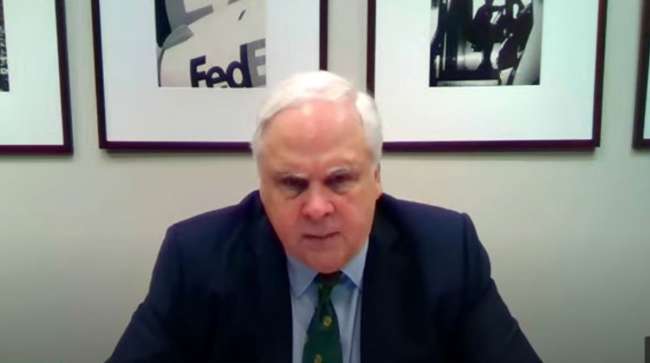Senior Reporter
FedEx, Stakeholders: Investments, Partnerships Key to Tackling Climate Change

[Stay on top of transportation news: Get TTNews in your inbox.]
Investing in infrastructure and adopting policies that enhance the movement of freight would help address the country’s climate change concerns, the head of FedEx Corp. told federal transportation policymakers March 17.
Noting the trucking industry’s role as a “critical link in maintaining supply chains,” especially during the COVID-19 pandemic, FedEx CEO Fred Smith called on congressional policymakers to “advocate for common-sense, environmentally friendly solutions to maximize trucking efficiency and increase environmental gains.”
Smith pointed to his company’s recent announcement about achieving carbon–neutral operations worldwide by 2040. He explained FedEx’s objective is to replace existing vehicles with electrification playing a central role in the transition.
We’re announcing our goal to become carbon neutral by 2040. With a designation of more than $2 billion and a collaboration with @Yale, we have the potential to influence global communities with our goal of building a sustainable future. Follow along at https://t.co/tOJOJFdpJ9. pic.twitter.com/8HAmzVENnM — FedEx (@FedEx) March 3, 2021
“Our ambitious agenda at FedEx shows that businesses can and will lead in the effort to create a sustainable future for us all. However, we cannot do this alone,” said Smith, directing his remarks at the House Transportation and Infrastructure Committee. Provisions pertaining to climate change, as well as electrification are expected to dominate the panel’s agenda this year.
Smith went on to note the company intends to offer end-to-end sustainability options for its supply chains through carbon–neutral shipping. FedEx also plans to continue collaborating with industry stakeholders, government agencies and alternative fuel suppliers to develop and invest in cost-effective alternative fuels.
Smith added, “Government, industry stakeholders, and academia must continue to work together to adopt policies and regulations that help create a performance-based path that will foster and promote innovation in this field, ensuring that the U.S. maintains its status as a global leader in climate change policy, while also stimulating economic growth and job development.”
Smith also suggested lawmakers consider adopting policies that would pave the way for the mainstream use of twin 33-feet combination trailers. Doing so, he explained, would lead to “environmentally friendly solutions to maximize trucking efficiency and increase environmental gains.” The allowable length for twin trailers nationwide is 28 feet, absent special permits.
“This increased capacity in our nation’s transportation system could reduce annual fuel use by 225 million gallons per year and reduce carbon emissions by 3 million tons per year, all at no cost to road safety or taxpayers,” Smith told the transportation panel.
FedEx Corp. ranks No. 2 on the Transport Topics Top 100 list of the largest for-hire carriers in North America.
Since January, Democrats, who make up the congressional majority, have amplified President Joe Biden’s desire to “build back better” via environmentally centric policies. The president has called for a vast economic relief campaign that would include providing fleets of electric vehicles with 500,000 charging stations along the nation’s highways.

Konar
Shameek Konar, CEO of Pilot Flying J, representing the National Association of Truckstop Operators (Natso) said during the hearing that setting up 500,000 electric vehicle charging stations over the next decade would necessitate input from utilities and fuel retailers. Essentially, the federal government would benefit from partnerships with industries already working on this issue.
“Federal incentive policies should harness the core competencies of the utility and retail fuel sectors,” Konar told the House transportation panel. “Neither sector can create a sustainable, nationwide [electric vehicle] charging network without the other, especially in an expeditious, efficient and economical way.”
Troy Rudd, CEO at consulting firm AECOM, observed the committee has an opportunity to “champion new design and performance methodologies that harness cutting-edge technologies, and inspire and incentivize our clients to build next generation, long-lasting infrastructure.”
The freight stakeholders appeared before the transportation panel as Chairman Peter DeFazio (D-Ore.) said he is preparing to update the country’s premier highway policy law. Policymakers are aiming to wrap up consideration of the next highway policy bill by September, before the current highway law expires.
Democrats and the White House have signaled the likelihood of producing a multitrillion-dollar infrastructure policy package that includes surface transportation proposals. DeFazio insists he intends to pursue a transformative policy package designed to address severe-weather resilience concerns across infrastructure systems. He also has pointed to a need for paving the way for myriad transportation technologies awaiting input from Congress.
“We will need commitment at all levels of government, and from the private sector, to achieve significant reductions in carbon pollution in the transportation sector, to transition to large-scale decarbonization, and to invest in the infrastructure upgrades to make our assets and facilities resilient to extreme weather events,” DeFazio said. “Failure to protect assets and to invest in emissions reductions will have real financial consequences to businesses and transportation agencies both now and in the long run.”
Meanwhile, Rep. Sam Graves (R-Mo.), the transportation committee’s ranking member, acknowledged benefits stemming from infrastructure capable of withstanding the impact of severe-weather events. He and fellow Republicans are urging DeFazio to approach the next highway policy legislation through a bipartisan lens.
“You will not find bipartisan support for heavy-handed government mandates, one-size-fits-all policies, or the complete upending of our traditional infrastructure programs to enact excessive climate goals that look more like the liberal agenda outlined in the Green New Deal,” said Graves, noting the Green New Deal progressive proposal. “We are willing to work with our Democratic colleagues on the goal of reducing emissions in transportation. However, my colleagues must also understand that people are not going to stop driving cars or flying on airplanes.”
Want more news? Listen to today's daily briefing below or go here for more info:




